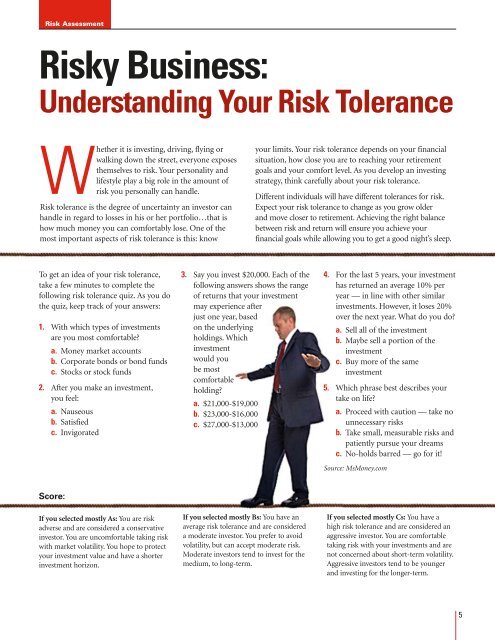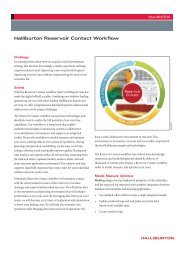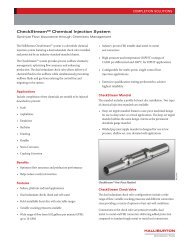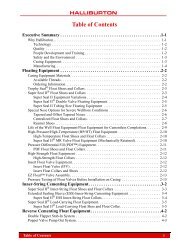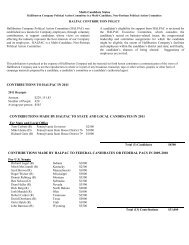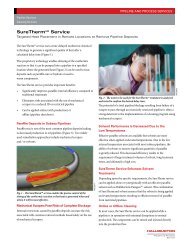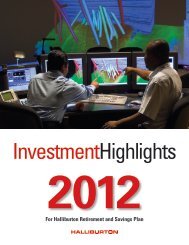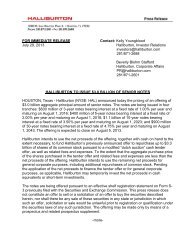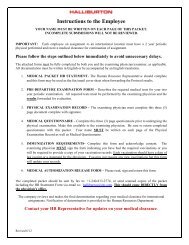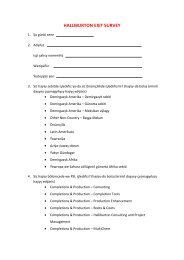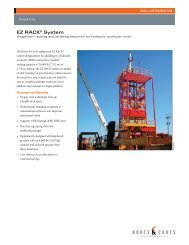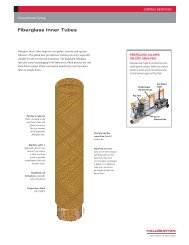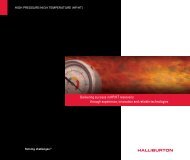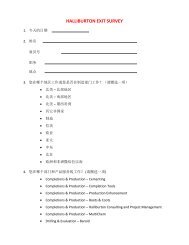Market Timing: Big Wins or Big Trouble? - Halliburton
Market Timing: Big Wins or Big Trouble? - Halliburton
Market Timing: Big Wins or Big Trouble? - Halliburton
Create successful ePaper yourself
Turn your PDF publications into a flip-book with our unique Google optimized e-Paper software.
Risk Assessment<br />
Risky Business:<br />
Understanding Your Risk Tolerance<br />
Whether it is investing, driving, flying <strong>or</strong><br />
walking down the street, everyone exposes<br />
themselves to risk. Your personality and<br />
lifestyle play a big role in the amount of<br />
risk you personally can handle.<br />
Risk tolerance is the degree of uncertainty an invest<strong>or</strong> can<br />
handle in regard to losses in his <strong>or</strong> her p<strong>or</strong>tfolio…that is<br />
how much money you can comf<strong>or</strong>tably lose. One of the<br />
most imp<strong>or</strong>tant aspects of risk tolerance is this: know<br />
your limits. Your risk tolerance depends on your financial<br />
situation, how close you are to reaching your retirement<br />
goals and your comf<strong>or</strong>t level. As you develop an investing<br />
strategy, think carefully about your risk tolerance.<br />
Different individuals will have different tolerances f<strong>or</strong> risk.<br />
Expect your risk tolerance to change as you grow older<br />
and move closer to retirement. Achieving the right balance<br />
between risk and return will ensure you achieve your<br />
financial goals while allowing you to get a good night’s sleep.<br />
To get an idea of your risk tolerance,<br />
take a few minutes to complete the<br />
following risk tolerance quiz. As you do<br />
the quiz, keep track of your answers:<br />
1. With which types of investments<br />
are you most comf<strong>or</strong>table?<br />
a. Money market accounts<br />
b. C<strong>or</strong>p<strong>or</strong>ate bonds <strong>or</strong> bond funds<br />
c. Stocks <strong>or</strong> stock funds<br />
2. After you make an investment,<br />
you feel:<br />
a. Nauseous<br />
b. Satisfied<br />
c. Invig<strong>or</strong>ated<br />
3. Say you invest $20,000. Each of the<br />
following answers shows the range<br />
of returns that your investment<br />
may experience after<br />
just one year, based<br />
on the underlying<br />
holdings. Which<br />
investment<br />
would you<br />
be most<br />
comf<strong>or</strong>table<br />
holding?<br />
a. $21,000-$19,000<br />
b. $23,000-$16,000<br />
c. $27,000-$13,000<br />
4. F<strong>or</strong> the last 5 years, your investment<br />
has returned an average 10% per<br />
year — in line with other similar<br />
investments. However, it loses 20%<br />
over the next year. What do you do?<br />
a. Sell all of the investment<br />
b. Maybe sell a p<strong>or</strong>tion of the<br />
investment<br />
c. Buy m<strong>or</strong>e of the same<br />
investment<br />
5. Which phrase best describes your<br />
take on life?<br />
a. Proceed with caution — take no<br />
unnecessary risks<br />
b. Take small, measurable risks and<br />
patiently pursue your dreams<br />
c. No-holds barred — go f<strong>or</strong> it!<br />
Source: MsMoney.com<br />
Sc<strong>or</strong>e:<br />
If you selected mostly As: You are risk<br />
adverse and are considered a conservative<br />
invest<strong>or</strong>. You are uncomf<strong>or</strong>table taking risk<br />
with market volatility. You hope to protect<br />
your investment value and have a sh<strong>or</strong>ter<br />
investment h<strong>or</strong>izon.<br />
If you selected mostly Bs: You have an<br />
average risk tolerance and are considered<br />
a moderate invest<strong>or</strong>. You prefer to avoid<br />
volatility, but can accept moderate risk.<br />
Moderate invest<strong>or</strong>s tend to invest f<strong>or</strong> the<br />
medium, to long-term.<br />
If you selected mostly Cs: You have a<br />
high risk tolerance and are considered an<br />
aggressive invest<strong>or</strong>. You are comf<strong>or</strong>table<br />
taking risk with your investments and are<br />
not concerned about sh<strong>or</strong>t-term volatility.<br />
Aggressive invest<strong>or</strong>s tend to be younger<br />
and investing f<strong>or</strong> the longer-term.


